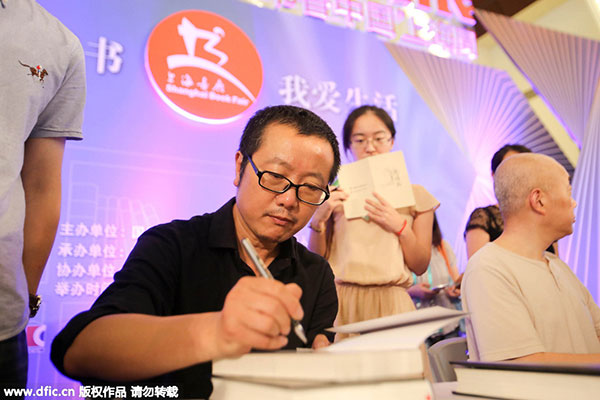One Hugo Award does not a sci-fi culture make
Updated: 2015-08-27 07:46
By Yang Xingdong(China Daily)
|
||||||||
 |
|
Chinese author Liu Cixin has won the Hugo Award for Best Novel on Aug 23. [Photo/IC] |
Liu Cixin has won this year's Hugo Award for Best Novel for his The Three-Body Problem. In doing so, Liu has become the first Chinese science-fiction writer to win such a prestigious international award. His achievements in the field of science fiction are well known, and the Best Novel award, announced in Seattle on Aug 23, is indeed a breakthrough for Chinese sci-fi writers.
But is netizens' opinion that Liu has single-handedly taken Chinese sci-fi writing to the highest international level and filled the years of vacuum in the genre correct?
There is no denying Liu is an excellent sci-fi writer, and his personal achievements are immense. But despite that, sci-fi writing is still in a rather depressing stage in China judging by the overall standard of works. Also, science fiction attracts only a small group of Chinese readers.
That sci-fi literature is important there is no doubt. Jules Verne's From the Earth to the Moon, in a way, provided the rocket (projectile in the book) launch site (Kennedy Space Center in Florida) for the "Moon Mission" more than a century before Neil Armstrong and Buzz Aldrin stepped on the surface of the Moon. In his masterpiece Twenty Thousand Leagues Under The Sea, Verne accurately details the features of a submarine while describing Captain Nemo's ship, the Nautilus, which was ahead of its time because submarines then were very primitive vessels.
Sci-fi writing, in a sense, has played a role in scientific exploration. Be it the Three Laws of Robotics, described by Isaac Asimov, or the Star Wars series, still regarded by many as the best sci-fi production, science fiction, as an exploration tool, has given rise to a powerful sci-fi culture in the United States. Thanks to this culture, science has not only been attracting youths, but also inspiring and/or influencing them to become scientists.
In comparison, and despite Liu winning this year's Hugo Award, we in China are still far from building a sci-fi culture. A literary genre cannot become popular if its readership remains small. A quick browse through online literature websites most popular in China would show the younger generations loves fantasy novels the most. Moreover, there are hardly any film or TV works based on Chinese sci-fi writing, and the one or two that have been failed to attract viewers were poorly conceived and executed.
In a society where the majority remains averse to sci-fi works, people will lack the passion for science and the urge to become scientists, which is detrimental to scientific research and innovation.
Therefore, we should see the panorama beyond individual success in the field of science fiction despite celebrating the success of Liu. Science fiction could gain wider attention and spread quickly if good works are produced in Chinese. But this is a tough task considering that the only existing platform for sci-fi literature and discussion in China is the Sci-fi Literature magazine.
It is important to spread awareness about science fiction and, in particular, direct youths' attention to sci-fi writing to create the right atmosphere for the healthy development of this wonderful literary genre. Only by doing so can we produce excellent sci-fi novelists like Liu and take forward the cause of science.
The article was first published on gmw.cn
- Global health entering new era: WHO chief
- Brazil's planning minister steps aside after recordings revelation
- Vietnam, US adopt joint statement on advancing comprehensive partnership
- European border closures 'inhumane': UN refugee agency
- Japan's foreign minister calls A-bombings extremely regrettable
- Fukushima impact unprecedented for oceans: US expert

 Stars of Lijiang River: Elderly brothers with white beards
Stars of Lijiang River: Elderly brothers with white beards
 Wealthy Chinese children paying money to learn British manners
Wealthy Chinese children paying money to learn British manners
 Military-style wedding: Fighter jets, grooms in dashing uniforms
Military-style wedding: Fighter jets, grooms in dashing uniforms
 Striking photos around the world: May 16 - May 22
Striking photos around the world: May 16 - May 22
 Robots help elderly in nursing home in east China
Robots help elderly in nursing home in east China
 Hanging in the air: Chongqing holds rescue drill
Hanging in the air: Chongqing holds rescue drill
 2.1-ton tofu finishes in two hours in central China
2.1-ton tofu finishes in two hours in central China
 Six things you may not know about Grain Buds
Six things you may not know about Grain Buds
Most Viewed
Editor's Picks

|

|

|

|

|

|
Today's Top News
Liang avoids jail in shooting death
China's finance minister addresses ratings downgrade
Duke alumni visit Chinese Embassy
Marriott unlikely to top Anbang offer for Starwood: Observers
Chinese biopharma debuts on Nasdaq
What ends Jeb Bush's White House hopes
Investigation for Nicolas's campaign
Will US-ASEAN meeting be good for region?
US Weekly

|

|







